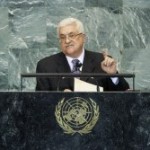NEW YORK—Palestinian President Mahmoud Abbas on Friday announced to the United Nations General Assembly that the Palestinians have applied for full UN membership with the 1967 lines as borders and east Jerusalem as its capital, despite the United States’ pledge to veto such a move. Abbas called upon the Security Council to approve the decision. The move sets up a potential diplomatic showdown with the US and possibly major European nations as well.
The rhetorical battle has already begun. Abbas sent a strong message to the US during his speech, saying that he did not believe that “anyone with a shred of conscience can reject our application for a full membership in the United Nations and our admission as an independent state.”The Mideast Quartet—which includes the US and European Union—later called for a peace deal by the end of 2012 in an apparent effort to avoid conflict. The timetable suggested by the Quartet may help meet Abbas’ preconditions to talks.
Abbas argued that approving the Palestinian application for membership would help negotiations by setting the terms ahead of time, saying that “it is futile to go into negotiations without clear parameters and in the absence of credibility and a specific timetable.”
In the past they have called upon the Israelis to accept the 1967 lines, which would give the Palestinians the entire West Bank and Gaza Strip, with agreed upon swaps, as the basis for negotiations prior to the beginning of talks. Abbas did not suggest any significant new concessions the Palestinians could make.
The Israelis have expressed the concern that an extremist resolution in the UN could make Palestinian compromise even more difficult, while the US has called it an “unhelpful” move that could raise tensions.
Abbas repeatedly slammed Israel in his speech, blaming them for the failure of peace negotiations. Less than an hour later, Israeli Prime Minister Benjamin Netanyahu said in his speech to the UN that “the truth is that Israel wants peace… The truth is that so far the Palestinians have refused to negotiate. The truth is that Israel wants peace with a Palestinian state, but the Palestinians want a state without peace. And the truth is you shouldn’t let that happen.”
According to a transcript of Netanyahu’s speech, posted on the website for the Israeli Embassy to the US, the Israeli leader called for Abbas to meet with him in New York “today.” He also called for Israeli security concerns to be addressed in a peace deal.
Netanyahu reminded the UN General Assembly that Israel already has made “sweeping” peace offers to the Palestinians that were rejected. He also recalled the Israeli withdrawal from Gaza and the subsequent terror attacks.
“We didn’t freeze the settlements in Gaza, we uprooted them. We did exactly what the theory says: Get out, go back to the 1967 borders, dismantle the settlements… But ladies and gentlemen, we didn’t get peace. We got war,” Netanyahu was quoted as saying. “We got Iran, which through its proxy Hamas promptly kicked out the Palestinian Authority. The Palestinian Authority collapsed in a day—in one day.”
He went on to say later that Israel was “prepared” for a Palestinian state in the West Bank, which includes sites of significant historic and religious significance to Israel, but that they did not want “another Gaza.”
Click here to read Netanyahu’s entire speech on the Israeli Embassy website.
Meanwhile, Israel has called for the Palestinians to recognize Israel as the nation state for the Jewish people, but Abbas implied in his speech the Arab belief that challenges Israel’s historic right to any of the territory between the Jordan River and the Mediterranean. While implying that they had accepted the right of Israel to exist in the territory, he noted some Palestinians fled their homes in Israel in 1948, blaming Israel for that as well, although it occurred during the 1948 Arab-Israel war in which multiple Arab armies attacked the newborn Jewish state. Abbas said that now the peace deal that can be reached is “relative justice.”
Said Abbas, “Because we believe in peace and because of our conviction in international legitimacy, and because we had the courage to make difficult decisions for our people, and in the absence of absolute justice, we decided to adopt the path of relative justice—justice that is possible and justice that could correct part of the grave historical injustice committed against our people.”
He further noted that the Palestinians agreed to build a state on “only 22% of the territory of historical Palestine,” calling it a “major concession.” While the region was known as “Palestine” for centuries, it was originally named that by the Romans.
Abbas repeatedly assailed the Israeli settlements as a devastating obstacle to peace. However, he did not note that Israel partly froze settlement construction for 10 months in 2009-10, during which time the Palestinians refused to renew direct peace talks until the freeze neared its end. The Palestinians suspended the last round of peace talks following the conclusion of the Israeli moratorium.
(By Joshua Spurlock, www.themideastupdate.com, September 23, 2011)

